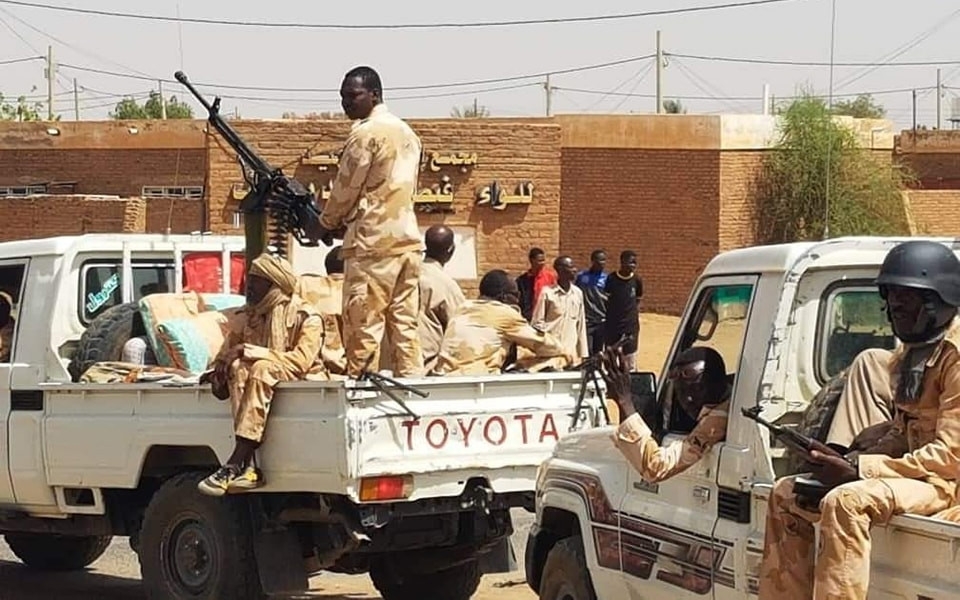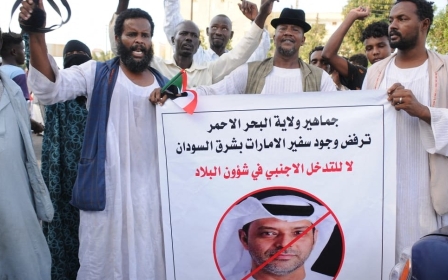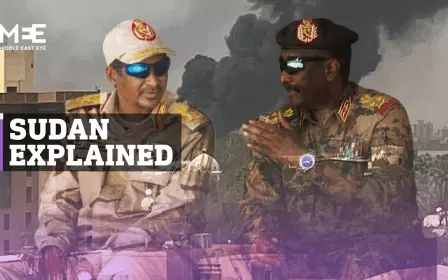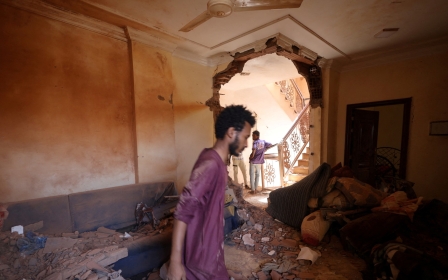Sudan's Central Reserve Police: The notorious force taking on the RSF

A notorious and controversial armed police force has entered the conflict in Sudan, backing the armed forces against the Rapid Support Forces (RSF) paramilitary.
The Sudanese Central Reserve Police, comprising an estimated 80,000 fighters, made its presence known in south Khartoum over the weekend, with members seen in white pickup trucks, wearing desert-coloured combat uniforms and equipped with mounted machine guns.
The Central Reserve Police are set to play a crucial role in the fighting in the capital, Khartoum, and will back up army units, analysts told Middle East Eye.
Sudan’s police and civil defence forces have been notably absent in recent weeks, with buildings and businesses set on fire and looting taking place in various areas of Khartoum.
Despite the announcement of a seven-day truce between the army and RSF, Sudanese citizens in Khartoum have told MEE that they could still hear shootings and fighter jets hovering above the city on Wednesday afternoon.
The conflict, which began in mid-April, has claimed almost 550 lives.
The Central Reserve Police gained notoriety in March 2022 when the US Department of the Treasury sanctioned them for “serious human rights abuse”.
The US Office of Foreign Assets Control (OFAC) said that "the CRP has used excessive force against pro-democracy protesters peacefully demonstrating against the military-led overthrow of the civilian-led transitional government in Sudan”.
'This police force has better training than the traditional police and it was established as a combat force'
- Sudanese analyst
OFAC's designation decision came after the army dissolved Sudan’s civilian government on 25 October 2021 and after the subsequent death of approximately 125 peaceful protesters.
On Sunday, the Sudanese Ministry of Interior said the Central Reserve Police, known locally as Abu Tira, would secure markets and properties from looting and vandalism in Khartoum.
The ministry stated that Reserve Police officers are graduates of the College of Police Sciences and Law, contradicting the RSF's claim that its members are from the People's Security force, which is linked to former President Omar al-Bashir's regime.
The Reserve Police was established in 1974 to quell tribal mutinies and participated in the Darfur conflict in February 2003.
"This police force has better training than the traditional police, and it was established and trained as a combat force. It is similar to the RSF forces in terms of its training, being a paramilitary force, and its ability to manoeuvre quickly on the ground," a Sudanese analyst told MEE, on condition of anonymity.
He added: "The Reserve Police is not at the front lines, but it supports the army and takes control of areas after the army clears them of RSF fighters."
Despite a week-long truce being declared, Sudanese citizens told MEE that the RSF was currently present in areas near the East Nile and Khartoum hospitals and the Republican Palace, while the army was advancing from the south of Khartoum to block exits to the southern, eastern and western regions, strangling the RSF and severing its logistical supplies.
Trained for urban warfare
Ali Alshaikh, a Sudanese writer and political analyst, told MEE that the Central Reserve Police are equipped with advanced weaponry, such as machine guns, anti-aircraft guns and modern high-precision rifles.
“They are trained for urban warfare,” he said.
Since 1990, the Reserve Police have focused on putting down conflicts in Darfur, and its cadres comprised soldiers who had just finished army service to be trained by special forces commanders.
'The force is currently responsible for maintaining security, which would alleviate pressure on the army'
- Ali Alshaikh, political analyst
"Unlike the armed forces, they have greater freedom of movement. The force is currently responsible for maintaining security, which would alleviate pressure on the army and provide rear protection by dealing with tasks such as capturing escaped criminals and returning them to prison," Alshaikh told MEE.
The Reserve Police has had several commanders over the years, and MEE was unable to verify who currently holds that position.
On Sunday, the Reserve Police was observed in the Al-Kalakla neighbourhood of south Khartoum, an area that holds no strategic significance apart from being close to the Reserve Police's former headquarters. The force claimed to have arrested 316 "mutineers" and advised Sudanese citizens to carry identification documents when in public.
Despite this, the south Khartoum region remains a high-priority area for the army and the RSF, as it is home to nearly 700,000 people. In the early stages of the conflict, the area experienced intense fighting, with army fighter jets bombing and destroying Taybat al-Hasnab, an RSF military base.
The RSF had previously attempted to gain control of the Yarmouk munitions factory, one of the largest on the African continent, located south of Khartoum, but it was unsuccessful. In 2012, Sudan accused Israel of bombing the factory.
On Wednesday, the RSF reported that it had successfully repelled an attack by the army and the Reserve Police in central Khartoum.
"The current situation in south Khartoum is calm, with open markets and a sense of normalcy in daily life, except in certain civilian areas where the RSF is hiding and being monitored by army fighter jets," the analyst told MEE.
Middle East Eye propose une couverture et une analyse indépendantes et incomparables du Moyen-Orient, de l’Afrique du Nord et d’autres régions du monde. Pour en savoir plus sur la reprise de ce contenu et les frais qui s’appliquent, veuillez remplir ce formulaire [en anglais]. Pour en savoir plus sur MEE, cliquez ici [en anglais].




